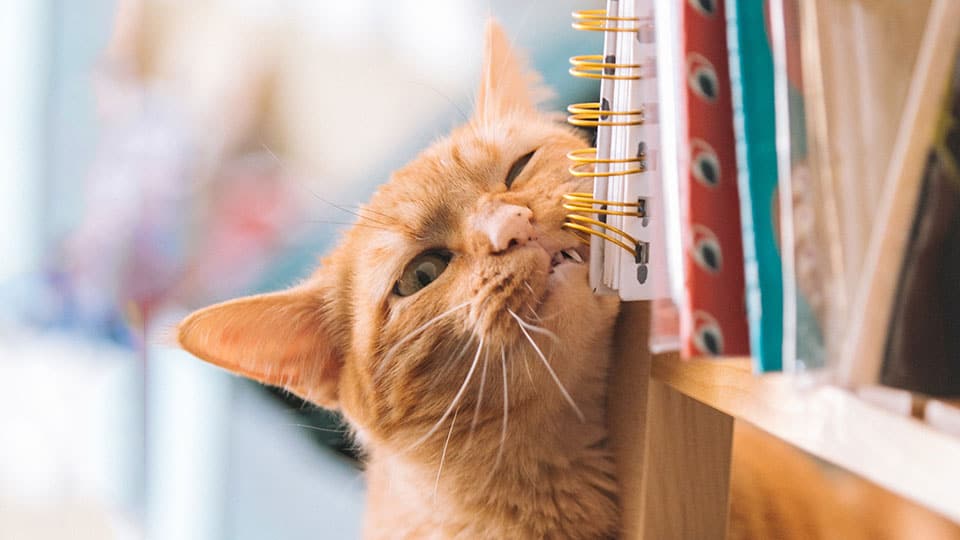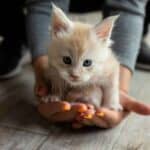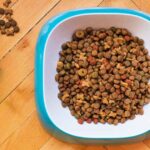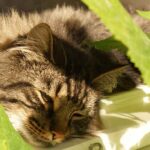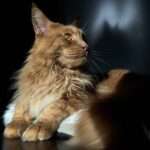If you own a Maine Coon cat, you probably know that they are not like other cats.
They are large, active, intelligent cats requiring special care and attention. They also have some unique characteristics and behaviors that make them stand out from the crowd. One of these is their heat cycle, which is the period when they are ready to mate and reproduce.
The heat cycle, also known as estrus or oestrus, is when a female cat’s body prepares for ovulation and fertilization.
During this time, the cat will show physical, behavioral, and vocal signs that indicate her readiness to mate.
The heat cycle is influenced by several factors, such as the cat’s age, season, environment, and health. The heat cycle can also affect the cat’s mood, appetite, and activity level.
Knowing the signs and duration of your Maine Coon cat’s heat cycle is important for several reasons.
First, it can help you to prevent unwanted pregnancies, which can lead to health risks and overpopulation.
Second, it can help you to plan ahead if you want to breed your Maine Coon cat, which can be a rewarding and challenging experience.
Third, it can help you to understand and cope with your Maine Coon cat’s behavior and needs, which can be stressful and frustrating for both you and your cat.
In this post, I will provide you with some information about how long Maine Coon cats are in heat, what are the signs of a Maine Coon cat in heat, and what to do when a Maine Coon cat is in heat. I hope this will help you to take good care of your Maine Coon cat and to enjoy their companionship.
How Long Are Maine Coon Cats in Heat?
The heat cycle of Maine Coon cats can vary depending on several factors, such as age, season, environment, and health.
However, the average length of the heat cycle for Maine Coon cats is about one week, and the average interval between heat cycles is about 21 days.
This means that your Maine Coon cat can go into heat about once every three weeks, and stay in heat for about seven days.
Of course, this is just an average, and some Maine Coon cats may go into heat more often or less often than the average.
For example, some Maine Coon cats may go into heat every two weeks, or every four weeks, or even every six months.
Some Maine Coon cats may also have longer or shorter heat cycles than the average, ranging from a few days to a few weeks.
Some Maine Coon cats may not go into heat at all if they are spayed or have certain medical conditions.
Spaying is a surgical procedure that removes the ovaries and uterus of a female cat, which prevents her from going into heat and getting pregnant.
Spaying can also reduce the risk of some diseases, such as mammary cancer and uterine infections.
Spaying is recommended for Maine Coon cats that are not intended for breeding, as it can improve their health and well-being.
Some medical conditions, such as ovarian cysts, hormonal imbalances, or infections, can also affect the heat cycle of Maine Coon cats.
These conditions can cause irregular or absent heat cycles, or prolonged or frequent ones.
If you notice any changes or abnormalities in your Maine Coon cat’s heat cycle, you should consult your vet for diagnosis and treatment.
What Are the Signs of A Maine Coon Cat in Heat?
The signs of a Maine Coon cat in heat can be physical, behavioral, or vocal, and they may vary from cat to cat. However, some of the common signs of a Maine Coon cat in heat are:
• Squatting: Your Maine Coon cat may squat or crouch on the floor, with her tail raised and her hind legs slightly apart. This is a posture that invites mating, and it also exposes her genitals, which may be swollen and moist.
• Spraying: Your Maine Coon cat may spray urine on objects or surfaces, such as furniture, walls, or your clothes. This is a way of marking her territory and attracting potential mates, as her urine contains pheromones, which are chemical signals that convey information about her reproductive status.
• Rubbing: Your Maine Coon cat may rub her head, body, or tail against you, other cats, or objects. This is a way of showing affection and soliciting attention, and it also transfers her scent, which can also attract potential mates.
• Meowing: Your Maine Coon cat may meow loudly and frequently, especially at night. This is a way of expressing her frustration and desire, and it also calls for potential mates. The meowing may sound like crying, moaning, or howling, and it can be very annoying and disturbing for you and your neighbors.
• Grooming: Your Maine Coon cat may groom herself more often and more thoroughly, especially around her genitals. This is a way of cleaning and preparing herself for mating, and it also stimulates her sexual arousal.
• Begging to go outside: Your Maine Coon cat may beg to go outside, by scratching at the door, window, or screen or by trying to escape. This is a way of looking for potential mates, and it also satisfies her curiosity and adventure. However, letting your Maine Coon cat go outside when she is in heat is very risky, as she may get lost, injured, or infected by diseases or parasites. She may also get pregnant by an unknown or unsuitable mate, which can result in unwanted kittens or genetic problems.
• Restlessness: Your Maine Coon cat may be restless and agitated, by pacing, jumping, or running around. This is a way of burning off her excess energy and excitement and shows her readiness and eagerness for mating.
Some Maine Coon cats may show more or less signs than others, and some may not show any signs at all if they are silent callers.
Silent callers are cats that go into heat without showing any obvious signs, such as meowing or spraying.
Silent callers are rare, but they do exist, and they can still get pregnant if they mate.
Therefore, it is important to monitor your Maine Coon cat’s behavior and health, and to consult your vet if you have any doubts or concerns.
What to Do When A Maine Coon Cat Is in Heat?
The best thing to do when a Maine Coon cat is in heat is to spay or neuter them, as this will prevent unwanted pregnancies, reduce health risks, and eliminate the discomfort and stress of the heat cycle.
Spaying or neutering is a safe and effective procedure that can be done at any age, but it is recommended to do it before your Maine Coon cat reaches sexual maturity, which is around six months of age.
Spaying or neutering can also improve your Maine Coon cat’s behavior and temperament, as it can reduce aggression, territoriality, and anxiety.
If you decide to spay or neuter your Maine Coon cat, you should find a reputable and experienced vet who can perform the surgery safely and professionally.
You should also prepare your Maine Coon cat for the surgery, by following the vet’s instructions, such as fasting, vaccinating, and medicating your cat.
Take care of your Maine Coon cat after the surgery by providing them with a comfortable and quiet place to rest, monitoring their recovery, and following the vet’s advice on feeding, grooming, and exercising your cat.
If spaying or neutering is not an option, either because you want to breed your Maine Coon cat, or because you have personal or religious reasons, there are other ways to help your Maine Coon cat in heat, such as:
• Providing them with comfort: You can comfort your Maine Coon cat by giving them extra attention, affection, and cuddles.
You can also provide them a warm, cozy bed, soft blanket, and favorite toy. You can also massage their back, belly, and ears, calming them down and relieving their tension.
• Providing them with distraction: You can distract your Maine Coon cat by playing with them, stimulating their mind, and engaging their senses. You can also provide them with interactive toys, puzzles, and games, keeping them busy and entertained. You can also introduce them to new sights, sounds, and smells, which can spark their interest and curiosity.
• Providing them with isolation: You can isolate your Maine Coon cat by keeping them indoors, away from other cats, especially males. You can also close the windows, doors, and curtains to block the view and sound of other cats. You can also use a spray bottle, a noise maker, or a water gun to deter unwanted visitors or intruders. You can also use a pheromone diffuser, a calming collar, or an herbal remedy to reduce your cat’s anxiety and stress.
These are some of the ways to help your Maine Coon cat in heat, but they are not foolproof or permanent solutions. They may not work for every cat or prevent your cat from getting pregnant or developing health problems.
Therefore, you should always consult your vet before trying any of these methods, and you should always monitor your cat’s condition and behavior.

